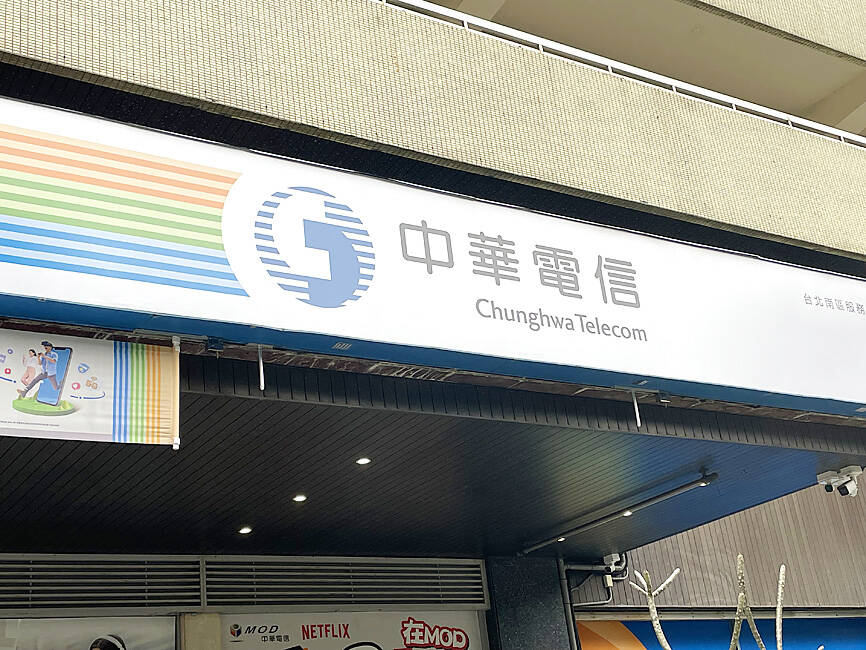Chunghwa Telecom Co (中華電信), the nation’s biggest telecom operator, yesterday said it plans a strategic cooperation with US geosynchronous orbit operator Astranis Space Technologies Corp for satellite procurement, the latest in a slew of efforts to boost network resilience.
The telecom’s remarks came after its board of directors approved a satellite investment program yesterday, a company filing with the Taiwan Stock Exchange showed.
No further details were disclosed.

Photo: Taipei Times file photo
Chunghwa Telecom is stepping up efforts to bolster its network resilience against geopolitical risks and natural disasters through investing in more submarine cables, microwave transmission devices and satellites.
“What we can do is prevent the communications network from disruptions,” Chunghwa Telecom chairman Alex Chien (簡志誠) told the Taipei Times in February in response to a question on how the company would cope with intensifying geopolitical tensions.
“We have been boosting safety resilience to hinder natural and human-made disasters [from disrupting networks]. That is why we are investing in so many undersea cables and 40 to 50 microwave transmission systems on the mountains,” he said.
The company aims to secure more satellite bandwidth to cope with demand from private businesses and the government to connect with overseas units, Chien said at the time.
Satellite communications would be a good backup in case undersea cables were damaged, although it would be unexpected, he said.
Astranis, based in San Francisco, builds and operates small and low-cost telecommunications satellites. The company’s first product, dubbed MicroGEO, operates in geostationary orbit and can provide dedicated service to entire nations and commercial partners alike with a single satellite, the company said on its Web site.
Astranis has commitments for more than US$1 billion of satellite services across 12 MicroGEO satellites and operates five satellites on orbit today, it says.
The collaboration with Astranis would complete the last piece in Chunghwa Telecom’s deployment in satellite communications. The company offers low Earth orbit satellite services in Taiwan through London-based Eutelsat OneWeb and medium Earth orbit satellite services from SES of Luxembourg. Before that, it started collaborating with Singapore Telecom Ltd in developing a new high Earth orbit satellite by investing 177 million euros (US$193.74 million) after jointly launching two satellites.
Chunghwa Telecom is reportedly exploring partnerships with Amazon.com’s Project Kuiper to offer satellite services in Taiwan.
Chunghwa Telecom expects its satellite services to contribute more than NT$1 billion (US$30.3 million) in revenue this year, compared with about NT$700 million last year.

NOT JUSTIFIED: The bank’s governor said there would only be a rate cut if inflation falls below 1.5% and economic conditions deteriorate, which have not been detected The central bank yesterday kept its key interest rates unchanged for a fifth consecutive quarter, aligning with market expectations, while slightly lowering its inflation outlook amid signs of cooling price pressures. The move came after the US Federal Reserve held rates steady overnight, despite pressure from US President Donald Trump to cut borrowing costs. Central bank board members unanimously voted to maintain the discount rate at 2 percent, the secured loan rate at 2.375 percent and the overnight lending rate at 4.25 percent. “We consider the policy decision appropriate, although it suggests tightening leaning after factoring in slackening inflation and stable GDP growth,”

DIVIDED VIEWS: Although the Fed agreed on holding rates steady, some officials see no rate cuts for this year, while 10 policymakers foresee two or more cuts There are a lot of unknowns about the outlook for the economy and interest rates, but US Federal Reserve Chair Jerome Powell signaled at least one thing seems certain: Higher prices are coming. Fed policymakers voted unanimously to hold interest rates steady at a range of 4.25 percent to 4.50 percent for a fourth straight meeting on Wednesday, as they await clarity on whether tariffs would leave a one-time or more lasting mark on inflation. Powell said it is still unclear how much of the bill would fall on the shoulders of consumers, but he expects to learn more about tariffs

Greek tourism student Katerina quit within a month of starting work at a five-star hotel in Halkidiki, one of the country’s top destinations, because she said conditions were so dire. Beyond the bad pay, the 22-year-old said that her working and living conditions were “miserable and unacceptable.” Millions holiday in Greece every year, but its vital tourism industry is finding it harder and harder to recruit Greeks to look after them. “I was asked to work in any department of the hotel where there was a need, from service to cleaning,” said Katerina, a tourism and marketing student, who would

i Gasoline and diesel prices at fuel stations are this week to rise NT$0.1 per liter, as tensions in the Middle East pushed crude oil prices higher last week, CPC Corp, Taiwan (台灣中油) and Formosa Petrochemical Corp (台塑石化) said yesterday. International crude oil prices last week rose for the third consecutive week due to an escalating conflict between Israel and Iran, as the market is concerned that the situation in the Middle East might affect crude oil supply, CPC and Formosa said in separate statements. Front-month Brent crude oil futures — the international oil benchmark — rose 3.75 percent to settle at US$77.01